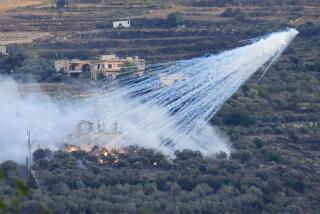Chemical Arms in the Middle East
- Share via
Your editorial commented that “failure to curb chemical-weapon proliferation may hit home during the Iraq crisis” and made the point that international prohibitions did not work: “Despite international prohibitions on their use, chemical warfare has not been as rare as the revulsion it provokes would suggest.”
This history was not lost on the participants to the conference on the “Prohibition of Chemical Weapons” held in Paris last year. On Jan. 14, 1989 they issued “The Final Declaration” which included the expected promises not to use chemical weapons but also this final paragraph:
“The participating States, recalling the Final Document of the First Special Session of the United Nations General Assembly Devoted to Disarmament in 1978, underline the need to pursue with determination their efforts to secure general and complete disarmament under effective international control so as to ensure the right of all States to peace and security.”
It is evident that the participating states had little faith in another round of promises. Chemical weapons--the “poor man’s atom bomb”--will be built as long as there are nuclear weapons.
However, your editorial ended far short of that conclusion and its implications for the Middle East.
EDWARD C. PERRY II
Palm Springs
More to Read
Sign up for Essential California
The most important California stories and recommendations in your inbox every morning.
You may occasionally receive promotional content from the Los Angeles Times.










